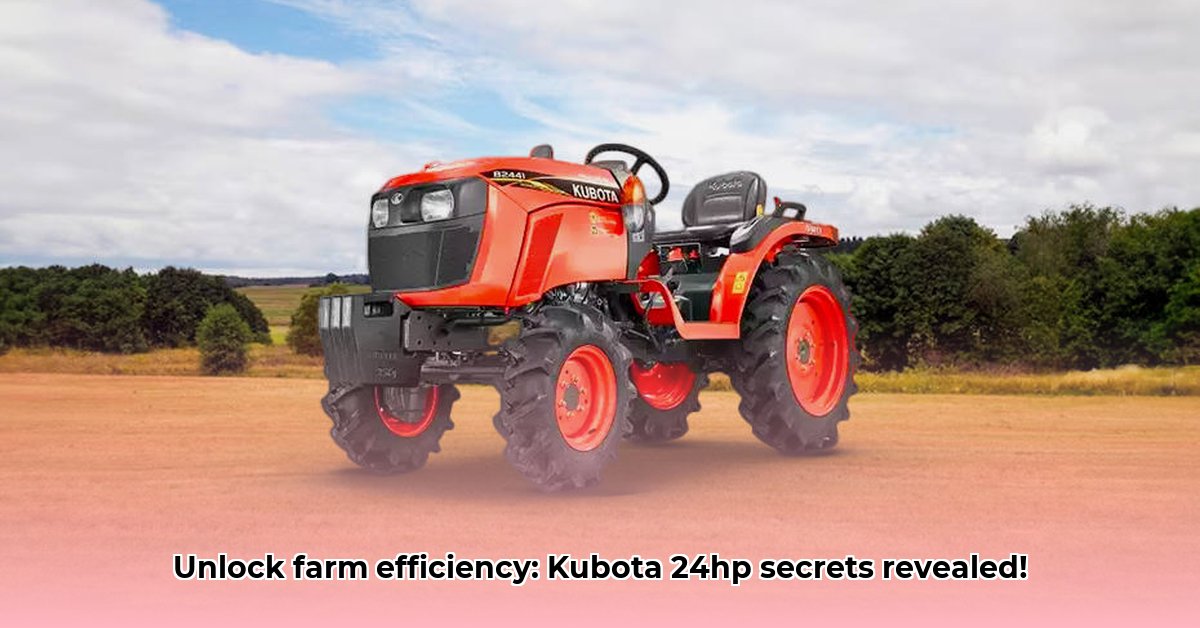
Kubota 24 hp Tractor: Your Sustainable Farming Partner
The agricultural landscape is evolving. Small-scale, sustainable farms increasingly seek efficient, affordable equipment. Compact tractors, like the Kubota 24 hp model (e.g., the L2501), offer a powerful solution, combining necessary power with fuel efficiency and environmental responsibility. This guide explores their role in sustainable agriculture, delves into the specifics of the Kubota L2501, and provides actionable steps to determine if this type of tractor is right for your farm. We'll also examine real-world examples and highlight the need for more comprehensive comparative data. For more details on Kubota tractor regeneration, check out this resource.
The Compact Tractor Revolution: Small Scale, Big Impact
Sustainable farming prioritizes responsible resource use. Compact tractors align perfectly with this goal. Their maneuverability excels in tight spaces, their power handles diverse tasks, and their fuel efficiency benefits both your budget and the environment. However, affordability, technological advancements, and supporting infrastructure remain critical factors. The Kubota 24 hp tractor represents a balance, providing performance without excessive environmental impact or cost.
Isn't it crucial to ensure your equipment choices mirror your commitment to sustainable practices?
Getting to Know the Kubota L2501: More Than Just Horsepower
The Kubota L2501, a popular 24 hp model, showcases the potential of compact tractors. Its powerful engine delivers reliable performance for various farm tasks. Engineered for fuel efficiency, it promises significant cost savings compared to larger tractors. The Power Take-Off (PTO) system allows for versatile implement attachment (e.g., tillers, mowers, loaders), maximizing functionality. Its hydraulic system further enhances adaptability.
Remember: Specific features may vary across Kubota's 24 hp models; consult the manufacturer's specifications for your chosen model.
What are the key features most important to your farming operation?
Is a Kubota 24 hp Tractor Right for Your Farm? A Step-by-Step Guide
Investing in farm equipment requires careful consideration. Follow these steps to make an informed decision:
- Assess Farm Needs: Identify your crops, acreage, and tasks requiring mechanization. A thorough assessment guides your tractor selection.
- Define Your Budget: Factor in the initial purchase price, ongoing expenses (fuel, maintenance, repairs), and potential financing options.
- Compare Tractor Models: Explore various 24 hp tractors from different manufacturers. Compare specifications, read user reviews, and prioritize essential features.
- Consult Experts: Seek advice from experienced farmers, agricultural professionals, or Kubota dealers. Their insights are invaluable.
- Test Drive (If Possible): Hands-on experience provides crucial insight into handling and operation, informing your final decision.
Don't rush this process. The right tractor is a long-term investment.
Real-Life Success Stories: Farmers Sharing Their Experiences
"My old equipment was a constant headache," shares John Smith, a third-generation organic vegetable farmer. "The Kubota 24 hp tractor is reliable, fuel-efficient, and has allowed me to expand my operation sustainably." This anecdote underscores the positive impact of efficient equipment on sustainable farming.
How can improved efficiency translate to greater sustainability on your farm?
The Need for More Data: Fueling Future Decisions
While the benefits of compact tractors are evident, more comprehensive data is needed. Direct comparisons with larger tractors in terms of fuel efficiency, maintenance costs, and lifespan are crucial. Data transparency regarding the total environmental impact over the tractor's lifetime is also essential. This will strengthen the case for compact tractors in sustainable agriculture.
What additional data points would be most helpful in your decision-making process?
Comparative Analysis: Kubota L2501 vs. Larger Tractors
Direct comparisons with larger tractors are essential to fully understand the lifecycle costs. A detailed comparative analysis, including initial investment, fuel consumption, maintenance, and lifespan, is critical for accurate assessment. This comprehensive evaluation helps determine the most cost-effective and environmentally sound solution for your farm’s specific needs. While complete data might be challenging to acquire, outlining the need for this data strengthens your decision process.
Does your farm's scale and tasks necessitate a larger tractor, or would a compact model offer sufficient capabilities?
Actionable Steps for Sustainable Farmers
- Conduct a thorough needs assessment: Accurately determine your land size, crop types, and farming operations to match the right tractor to your needs.
- Compare specifications: Scrutinize fuel efficiency, power output, and potential implements for each model you consider.
- Create a realistic budget: Include purchase price, implements, maintenance, fuel, and potential repairs for a complete picture.
- Explore financing options: Evaluate financing to help manage upfront costs.
- Prioritize preventative maintenance: Implement a structured maintenance schedule to avoid expensive unscheduled repairs.
Following these steps will significantly improve your chances of making a successful investment in your farm's long-term success.
The Narrative of Sustainable Success
Many small-scale farms have achieved success with Kubota 24hp tractors. Increased efficiency leads to greater productivity, reduced labor, and minimized environmental impact—a key aspect of sustainable farming. The ability to balance economic viability with environmental responsibility is a key driver in this trend.
[This article synthesizes publicly available information on tractor specifications and sustainable farming principles. Specific lifecycle cost comparisons require consultation with equipment dealers and dedicated research. For detailed Kubota model information, visit the official Kubota website.]